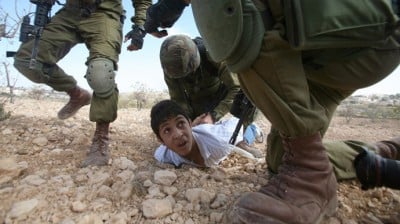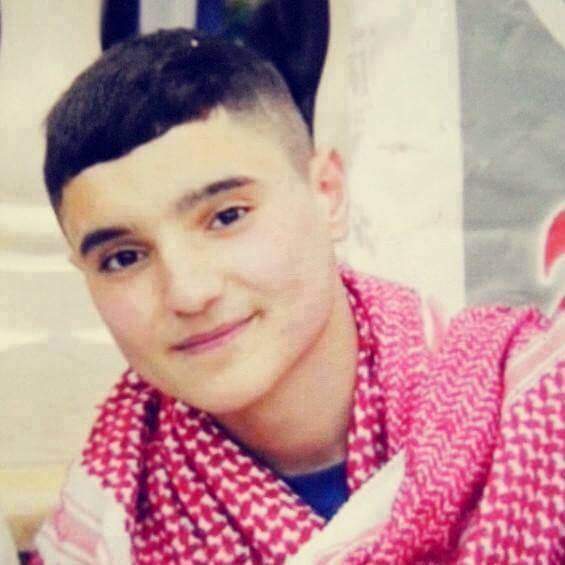The Systemic Incarceration of Palestinian Children
‘I am a mother amongst hundreds, we are all worried about our children’

Image: A Palestinian youth is arrested by Israeli soldiers in 2013 for throwing stones during a protest. (AFP Photo / Hazem Bader)
Palestinian children’s rights of survival, protection, education, health and development have been dramatically violated by Israel since the first Intifada. Palestinian children stand defenseless against Israeli policies that target them as potential “terrorists” and continue to justify and legalize a system in which child imprisonment and persecution is enforced under the umbrella of defeating “terrorism”.
For Israel, throwing stones is a serious security offense, and one of the most common accusations leading to the arrest of Palestinian children in the West Bank and East Jerusalem. The number of arrested Palestinian children has been escalating for the past two months. The Commission of Prisoners and Released Prisoners has documented nearly 400 children detainees currently being held in Ofer, Hasharon and Megiddo prisons. In addition, a number of children are being transferred to the new “Kevon” prison due to the increase. The deputy Director General of Legal Affairs in the Commission, Jamil Sa’deh, affirmed based on current visits that “the situation there is dreadful, the prison is overcrowded, there is not enough food, covers or hot water”. This alarming increase was also reported by Addameer (a prisoners support and human rights association) who counted 177 arrests for children in the West Bank and Jerusalem during October 2015. The Defense for Children International – Palestine (DCIP), estimated that around 700 Palestinian kids are arrested yearly, and that three out of four children experience physical violence (typically punching, slapping, pushing and kicking) during arrest, transfer or interrogation.
Israeli law and “security” prisoners
According to Mohammad Mahmoud, a lawyer at Addameer, who has defended 75 Palestinian minors from East Jerusalem, throwing stones is usually associated with the conviction of “violating police in aggravating circumstances” and therefore defined as a “security” offense. This allows the Israeli courts to not adhere to its own laws pertaining to youth offenders as well as international conventions regarding youth ratified by Israel. For example, the Commission of Prisoners points out that the first time arrested children see their parents is in court hearings, where they are not allowed to approach them. Even after a sentence, according to B’Tselem, a child detainee’s access to their family is “extremely restricted”. For example, as documented in the 2011 B’Tselem report No Minor Matter: Violation of the Rights of Palestinian Minors Arrested by Israel on Suspicion of Stone-Throwing, 28 minors out of the 29 cases investigated were not visited by their families.

Image: Khaled Alshiekh
Khalid Alshiekh, 14, from Biet Anan in the West Bank, talked about his arrest that took place on December 24, 2014. Khalid accepted a four-month plea bargain deal, and was released on April 14, 2015. He said: “The army ambushed us, they were hiding, they hit me on my head and I fainted, when I woke up I found my hands cuffed and I was blind folded, I think I stayed like this for 12 hours, I was thinking about my parents, I was scared and my head hurt me”.
Khalid’s parents did not know about their son’s arrest, his father Hussam said:
People told me my son got arrested. I managed to get to the investigation center “Bain Yamin” and I waited outside in the middle of the night….he was inside and I was prevented to see him or talk to him. I waited anyway, then I saw them taking him, he was handcuffed and had bruises on his face.
Moreover, Khalid was diagnosed with anemia, the military judge continued to reject the lawyer’s request to allow Khalid to take his medication despite the medical record which was provided to the court.

Image: Baker Awyes
Baker Awyes, 17, from East Jerusalem, is in prison at the moment waiting for his sentence, which has been postponed numerous times according to his lawyer, Mohammad Mahmoud. This is the tenth time Baker was arrested, he has been arrested twice a year on average since he was 13 years old. His mother said “they (the Israeli army) know him very well. Baker was not convicted of any charges in the previous nine times. She said: “I can’t see him or talk to him, I see him from far away during court hearings, last time I tried to approach him just tell him to stay strong, a soldier pushed me away, Baker got nervous and I quickly withdrew not to cause him additional problems”. She continued: “I am a mother amongst hundreds, we are all worried about our children, and I pray day and night that he is safe, I am scared”.
Ahmad Mansara as a symbol
For several years international human rights groups as well as Palestinian and Israeli NGOs and United Nations experts have repeatedly condemned the ill treatment Palestinian children receive during arrests, interrogations and detention. Human Rights Watch concluded last July in its report that:
Israeli security forces have used unnecessary force to arrest or detain Palestinian children as young as 11. Security forces have choked children, thrown stun grenades at them, beaten them in custody, threatened and interrogated them without the presence of parents or lawyers, and failed to let their parents know their whereabouts”.
Whereas, UNICEF confirmed in a 2013 report that “the ill-treatment of children who come in contact with the military detention system appears to be widespread, systematic and institutionalized”. Correspondingly, numerous videos and interviews recorded children’s descriptions on how they had been arrested, blind folded, cuffed, beaten and verbally abused during interrogation, are available online. The latest video to go viral was of Ahmad Mansara, 13, being interrogated by two Israeli officers questioning him about the alleged stabbing attack on Israeli settlers. The 10 minutes video reflects the psychological stress that child detainees find themselves under as Ahmad constantly pleads, “I don’t remember, not one thing. For God’s sake believe me”.
Ahmad Mansara’s interrogation video is seen by the parents of Palestinian children detainees as a “symbol” of how Palestinian children’s basic rights continue to deteriorate, in addition to the psychological ramifications for the child detainee on an emotional, psychological and social levels.
Palestinian children imprisonment: A financial strain for families
Most of arrested children are encouraged to accept a plea bargain deal, rather than face the possibility of prison time that could amount up to 20 years. Furthermore, a new bill passed initial readings in the Knesset last month, that imposes a mandatory minimum penalty of four years imprisonment for stone-throwing, in addition to stripping the social security benefits from the child’s parents.
Around 9o% of the minors convicted of stone throwing are given a prison sentence according to the Commission of Prisoners, Addameer and B’tselem. In addition to prison sentences or house arrests, 95 % of the sentences are accompanied by fines, some of which are exceedingly high. The families of Palestinian children detainees are obliged to pay fines as a punitive compensation of damage caused by throwing stones. The amount varies between 2000-5000 NIS ($515-1288). The Commission of Prisoners said that the total amount of fines paid to Israeli courts amounted to six million NIS ($1,546,781) in 2013. Moreover, the Palestinian authority stopped the financial aid dedicated to helping families of detainees in January 2014, as a way to not encourage Israeli courts to financially profit from Palestinian detainees. Not all families can afford paying such fines, some initiate collective funds from schoolmates, neighbors’ and friends, whereas others, particularly those with more than one child in prison take loans.
A mother of four prisoners Um Faris, from East Jerusalem who is struggling to pay fines imposed by the Israeli court said,
last year I had four sons in prison Faris, Mohammad, Ali and Mahmoud, each one of them was given a prison sentence and was charged with a fine of 4000 NIS ($1031), I pay monthly installments of 200 NIS ($52) for each… it was a very difficult time for me, I am still worried about their future, but hamdela (thank God), my situation is better than others, at least they are alive, other people lose their children forever.
Reem Abd Ulhamid has a BA in communication and media studies from Birzeit University and an MA in global communications from the the American University of Paris. Abd Ulhamid has held numerous positions in media for over seven years and has served as researcher, editor, producer, and director for different organizations. Her most recent work is focused on developments in social media and web 2.0. The parents of interviewed children were consulted before talking to them. Sophia Harb conducted interviews for this article.

